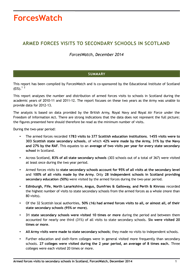Found 437 Results
Page 21 of 32
Armed Forces Visits to Secondary Schools in Scotland
19/12/2014

The report, compiled by ForcesWatch, is based on figures obtained under the Freedom of Information Act from the armed forces on their visits to Scottish schools. It has been co-sponsored by the Educational Institute of Scotland which has expressed concerns that some armed forces visits may have a recruitment purpose.
Also see Armed forces visits to schools in Scotland: An update for 2016-2017
‘Alternative Provision with a Military Ethos’ receives more funding – our response
10/12/2014
On 7 December 2014, Michael Gove’s successor as Secretary of State for Education Nicky Morgan made her support for the Military Ethos in Schools programme clear by pledging a further £4.8 million to eight ‘alternative provision with a military ethos’ schemes. This follows previous funding between 2012 and 2014 that amounted to £8.2 million. The Quakers have written a letter with their concerns about the new announcement to Nicky Morgan, which can be read here. Below are our key initial concerns.
YouGov poll finds that Britons tend to think less of the Army’s importance the younger they are
02/12/2014
As the British Army struggles to recruit new soldiers, YouGov polling finds that Britons tend to think less of the army’s importance the younger they are.
Troops to Teachers scheme failing to entice ex-soldiers into the classroom
24/11/2014
It was supposed to address teacher shortages and instil a military ethos in schools, but take up is tiny and dominated by non-graduates.
The Militarisation of Education: ‘Troops to Teachers’ and the Implications for Initial Teacher Education and Race Equality
19/11/2014
A critical look at the Military Ethos in Schools programme from education academic Charlotte Chadderton.
Education & the Military: A human rights & peace perspective
In this publication, QUNO questions the presence and influence of the military in primary and secondary education from a peace and human rights perspective. Concerned at the military’s involvement in schools and the militarisation of education, QUNO draws attention to relevant international human rights standards that promote education for peace.
Military Recruitment, Work & Culture in the South Wales Valleys
This article explores how social and cultural life in the south Wales valleys, an area of economic deprivation within Britain, has been shaped by the British military and militarism, in ways that are both specific to the area and shared with other regions throughout the country.
Troops to Teachers scheme extended
The Troops to Teachers scheme is being extended until the end of the 2016-2017 academic year, despite the fact that only 41 veterans started in the first cohort in January 2014, and only 54 in the second cohort in September 2014. The move has been criticised by the Association of Teachers and Lecturers…
How should we teach remembrance at school?
11/11/2014
Can war ever be celebrated, or is it essentially futile? Do remembrance rituals, symbols and ceremonies do more to romanticise warfare than bring home its horror? Does the event of remembrance exclude the sacrifice of those who died on the opposing side? Disagreement abounds on these issues and we are unlikely to see a public consensus any time soon. We should also think carefully about the part our schools play in these public events.
How ought war to be remembered in schools
10/11/2014

David Aldridge examines the reasons usually advanced for involving children and young people in commemorating the war dead, and finds many of them wanting. He critically examines the high profile in schools of charities, like the Royal British Legion, with vested interests in certain kinds of commemoration. And he argues forcefully for a justification of remembrance in schools that requires a major rethink of established rituals and practices.
More military days in schools
22/10/2014
This year over 550 schools around the country have had a Red, White and Blue Day on 11th October, which involves pupils raising money for three military charities by wearing red, white and blue clothing (the colours of the Union flag), or holding another fundraising event.
Spectacle, Reality, Resistance: Confronting a culture of militarism
06/10/2014

At a comfortable distance from warfare, our culture easily passes over its horrific reality in favour of an appealing, even romantic, spectacle of war. Militarism, past and present, attempts to control public opinion by aligning it with its own worldview. Spectacle, Reality, Resistance: Confronting a culture of militarism takes a fresh look at a culture of militarism in Britain, exploring these dynamics – distance, romance, control – in three essays, accompanied by three shorter pieces about the cultural treatment of war and resistance to the government’s increasingly prodigious efforts to regain control of the story we tell ourselves about war.
Military activity in UK schools
02/10/2014
The encroachment of the UK military and ‘military ethos’ on the UK education system means that alternatives to war and peaceful ways of resolving conflict will be more difficult for young people to explore. This article was originally published on Information for Social Change.
Conscience and Conviction – WWI school resources
23/09/2014

Quaker Peace and Social Witness has produced two new resources for peace education: Conscience (primary school-focused) and Conviction (secondary school-focused).
Conviction can supplement existing lesson materials in subjects such as History, Religious Education or Citizenship, and be used to support the delivery of Personal Social Health Education (PSHE) or Spiritual Moral Social Cultural (SMSC) education.
Through engaging with speaking and listening activities in pairs and groups, children can discuss and reflect on historical source materials including documents, letters, posters and images.
Page 21 of 32
